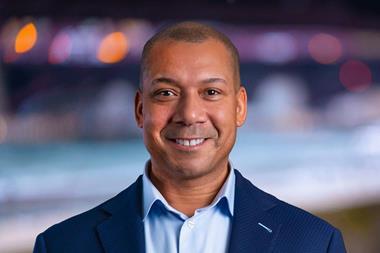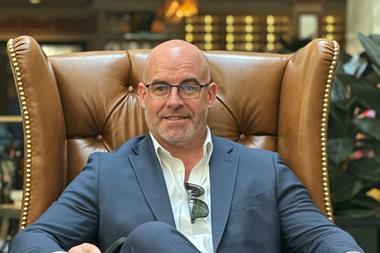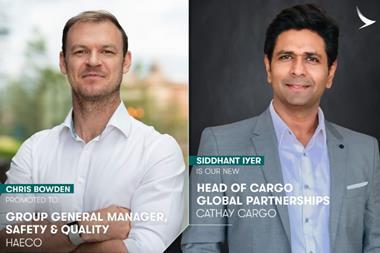It has been two years since Craig Smyth left his position as boss of ground handler Menzies Aviation.
During his 22 year tenure at the company he played a big role in Menzies’ growth to become one of the largest aviation businesses in the world, so he is a man used to overseeing company development.
Therefore he seems like the ideal candidate to take over from Olivier Bijaoui as chief executive of Worldwide Flight Services (WFS), a company which itself is going through a period of change and expansion.
The company was taken over by Platinum Equity in October last year and has been rapidly growing since then with a couple of high profile acquisitions.
This includes the purchase of a 51% stake in Fraport Cargo Services in November and in January it swooped on Consolidated Aviation Services (CAS) to spread its global reach in the US.
Smyth was just three weeks into the role when he spoke to Air Cargo News and still in the process of settling into his new Parisian lifestyle.
At the time he was living in a hotel but was looking forward to moving into an apartment and was getting used to the logistics of moving around the French capital.
His path into the aviation industry began when he qualified as a chartered accountant and the opportunity came up to work for John Menzies, which was looking to reduce its reliance on the magazine and book retail business.
It therefore began to expand its airfreight business through a series of acquisitions, eventually leading it into the wholesale business and then the acquisition of AMI.
Next came trucking and then cargo and ground handling. Smyth was appointed finance director when he joined the business in the early 1990s, a position he maintained for the first ten years of his time at the company. Then, in 2004, he took the step up to become chief executive, a role he occupied until 2015.
He spent around a year after his departure from Menzies on gardening leave before consulting on various projects for private equity companies looking at investing in aviation services.
“In doing so you build some quite strong relationships with the private equity world, hence the contact with Platinum, which has owned WFS for the last 12 months,” says Smyth.
“I guess I fell into the industry by accident but I couldn’t think of working in a better industry than this one.
“I think once you get into the aviation market then it’s in your blood and it’s great to be back in the industry with WFS.”
Smyth says he was attracted to WFS because it is the world’s leading cargo handler with a traditionally strong market position in Europe and now improved representation in North America through the acquisition of CAS.
“WFS is the second biggest ground handler and probably the biggest cargo handler. It is very well known for its cargo services and there is room to grow in that market.
“We can grow market share and try to win more business at our existing network of cargo facilities as well as going and building new capacity in existing countries and existing airports.
“We can also develop those couple of important bridgeheads in South America and Asia.
“It is a business that has an excellent ground handling operation, but it is not really known for it and that’s where I think I can help because I have a ground handling background.”
The ground handling and cargo handling industries have been going through consolidation and change of late. As well as the high-profile moves by WFS, China’s HNA group has swooped on Swissport, which itself acquired Servisair in late 2013, and dnata struck a deal to acquire Aviapartner’s cargo handling operations at Schiphol Airport.
Smyth expects the industry to continue to consolidate through acquisition, although he says that companies need time to digest their purchases before moving on.
“I think the trend of expansion through acquisition will continue and that it will continue to be led by the bigger players,” he says.
“There is usually a time to pause because there is only so much that each organisation − speaking generally here − can digest.
“WFS has played its part, firstly by being bought by Platinum and then spending a significant amount of money on CAS in the US.
“Our focus is on integrating the two businesses and making sure we are still giving consistently good service, safety and security, whilst delivering some cost synergies to pay back on the investment.
“With Fraport Cargo Services, we’ve got to maintain operational standards whilst making sure we maximise the value of the acquisition.
“So to me a big focus of mine is making sure the integration, which is well on track, keeps going before we go do anything like that again.”
Looking at the air cargo industry as a whole, airlines continue to see low yields – caused by overcapacity – as their main challenge.
With cargo handlers seen as a cost to airlines, there is a need to make sure operations are as efficient as possible, while maintaining high standards.
This is especially true given that cargo handling contracts are up for renewal every three to five years, meaning that up to a fifth of global revenues are out to tender at any point in time.
“We’ve got to make sure that we are looking at efficiencies,” says Smyth before rhetorically asking: “Are we using our own cargo facilities, either on long-term leases or our own, to the best of their ability? How are we using any spare capacity we’ve got? Are we managing our labour? Are we hiring the right sort of labour? Are we deploying it in the most efficient way? Are we incentivising the staff to be productive and be safe and secure?
“I think that is the big challenge for cargo and ground handlers; maintaining the best service standards but at the most economic cost and therefore price when it comes to what you charge the airlines.”
Another challenge that the cargo handling industry in general faces is the ability to maintain a network of operations that all provide the same high level of service.
Airlines in the past have said they sometimes use a different cargo handler in certain locations because in one place a company may be the best in the area and in another the worst.
Smyth says the best way to avoid this problem is to introduce a standard set of processes with the right IT to back that up across the whole network.
“It’s across all the columns of the business, be it people, be it IT, how you recruit, how you train, the processes, the type of equipment you buy, how you sort out your cargo facilities, what is mechanised, what is not mechanised.
“This is the same challenge that I had back in 2004 with Menzies, which was formed after a series of acquisitions.
“But again we need to recognise that different environments might need adaptations and there are different cultures out there, but the charm is to try and get 75%-80% standardised.”
So although it’s only been three weeks since Smyth took up the role, has he enjoyed adapting to the culture of WFS?
“It’s a fantastic culture and I’m a great fan of understanding the history of a business, so I’m very proud to come and work with this organisation and be based in Paris.
“I’m lucky, as are most of us Brits, in that the international language of aviation is English but I’m going to try and learn and speak more French [Smyth studied French for eight years but admits he hasn’t spoken it much since then].
“Everybody at WFS has been extremely warm and welcoming. Doing tours of facilities it’s good to see that everybody is shaking hands and has a good working relationship.
“I’m only a few weeks into the job and I’ve been round much of the French operation, although not yet overseas, but it seems there is tremendous culture to go and support and harness here.”










